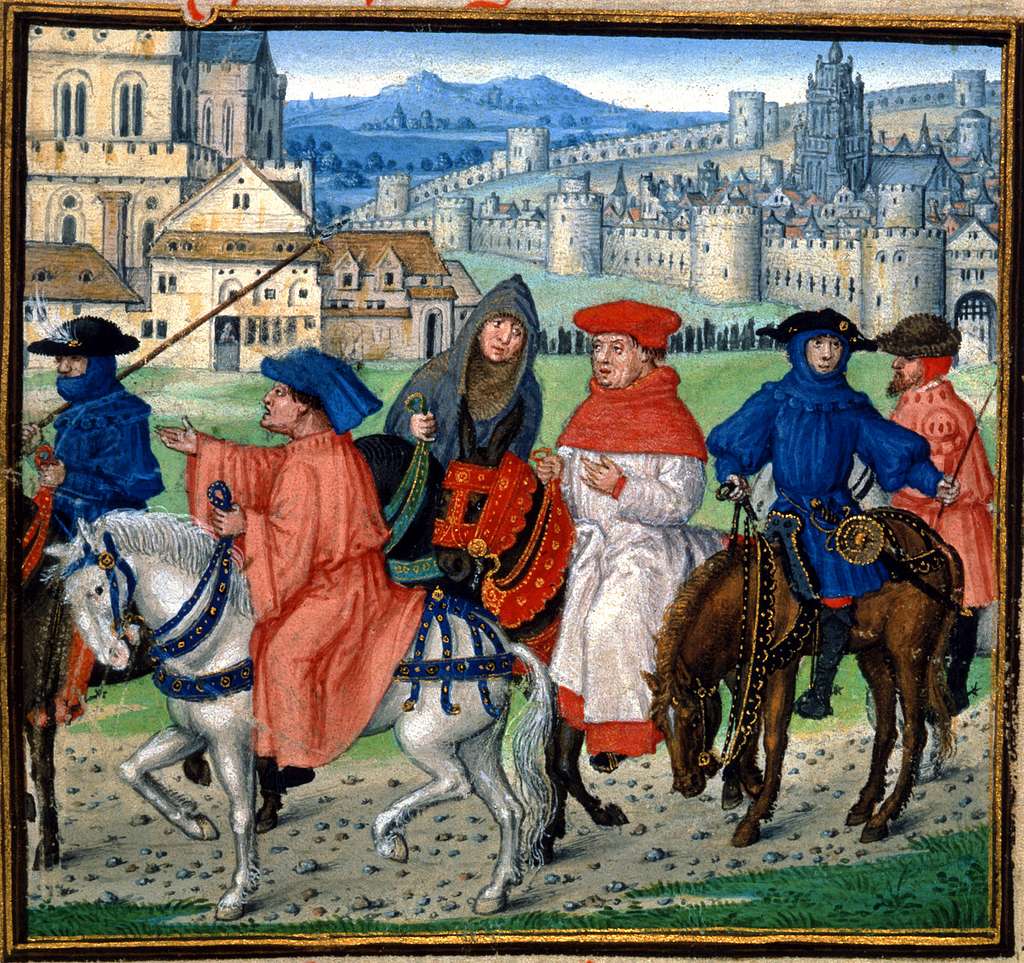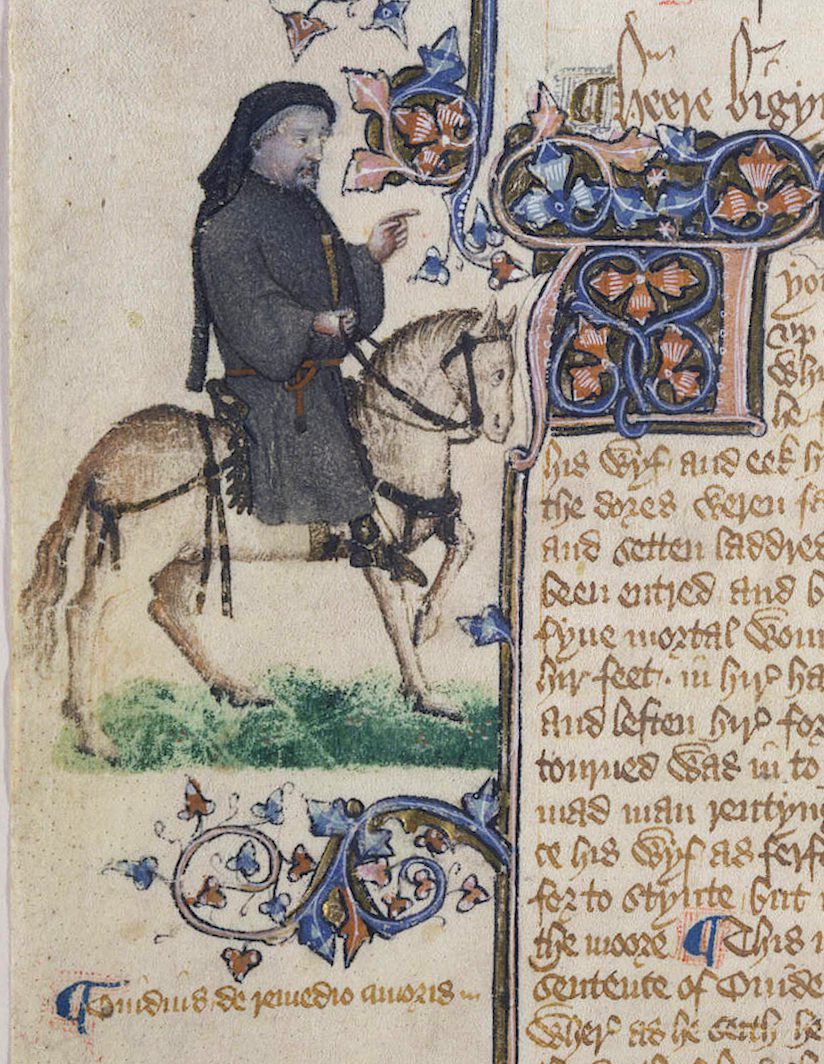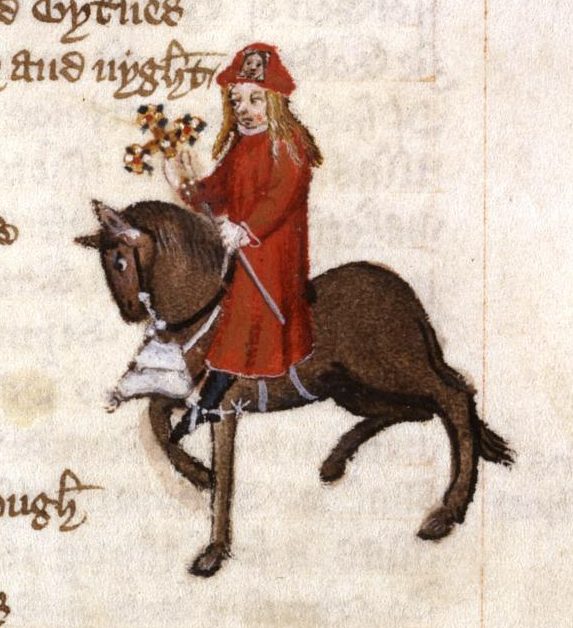


A Reading from Chaucer in Middle English
As a medievalist and himself a wit and raconteur, Henry Grinberg has taken abiding delight in Chaucer. Here he reads from The Canterbury Tales in Middle English: in the first selection, the General Prologue (GP) lines 1–746; in the second selection, GP lines 747–858, followed by the complete Pardoner’s Prologue and Pardoner’s Tale (PardT). The recording was made in 1986 on tape cassette for his label Medieval Sounds.
A Review of the Reading
Listeners’ Guide to Medieval English, A Discography by Betsy Bowden
(Garland Reference Library of the Humanities, Vol. 912, Garland Publishing, New York & London, 1988)
"This GP recording has to recommend it careful pronunciation, several clever features, and overall artistic consistency that encompasses a discomfiting finale in which all the pilgrims, drawn into unity by the ever-agreeable narrator, turn as a body to make open mockery of the Host behind his back. The occasional slips into ModE vowels involve minor words, except for a ModE “soong” in GP 122 and an out-and-out American “glas” in 198, plus an odd but repeated pronunciation of ME “knew(e)” to rhyme with ModE “day.”
Although the clever features might grate in a less skillful performance, here they help convey the narrator’s genial compliance in turn with each pilgrim’s personality and point of view. Before the last name in the long list of medical authorities known by the Physician, for example, in GP 434 the narrator emits a distinct “whew!” He sings the Friar’s “In principio”; he pinches his nose to imitate the Prioress’s singing and again for the Pardoner’s hair (GP 254, 123, 679).
The narrator condemns no one. Nor is he fooled by anyone—not even by the Knight who, he knows full well, is motivated less by “worthynesse” than by “sovereyn prys” (GP 50, 67). Each pilgrim thinks well of himself; and the narrator agrees soothingly with the Friar, agrees with the Reeve in tones of crotchety secretiveness, agrees with the Clerk that those who pay should be prayed for first. He most assuredly agrees that what the Wife of Bath did in youth is nobody’s business but her own. He questions her stance only in the distinctness of his switch to the Parson’s devout tones. Then gradually we come to realize that we are hearing a Parson as self-satisfied as anybody else, preaching a sermon concerning exemplary parsons who much resemble himself (GP 477 ff.). The narrator even avoids overt condemnation while imitating the Summoner’s harsh snarl and his simple-minded machismo that relishes a child-scaring appearance (e.g., GP 646, 658, 673–74).
Certainly the Host is no less self-deluded than any of the pilgrims, pompously “boold” in GP 755 and merry on the several occurrences of that term. Money is foremost in his concerns, as conveyed by “ahem” before line 760 and by other inflections. Still, it seems harsh for the narrator, representing the flock, to laugh outright at references to the “juggement” of their self-appointed “governour” (GP 818, 813).
The Host is no dupe, however, when he coolly silences the Pardoner at the close of the second selection on this tape. Some critics suggest that the Pardoner, carried away by his own eloquence in PardT 919–45, sincerely tries to sell pardons to the pilgrims. This Pardoner, instead, gets carried away by his own teasing. After chuckling at the Christ’s-pardon benediction, PardT 916–18, he starts kidding the other pilgrims and keeps on long after the joke has worn thin. The Host is glad for the chance to make everyone else comfortable by silencing the Pardoner. His heartiness tips to decisive irritation only on the last two lines, PardT 954–55, to make sure that he is understood by one so insensitive to others’ responses.
The Pardoner’s insensitivity appears elsewhere in this performance. In his Prologue, he eagerly confides his tactics, unaware that some would consider them evil or unsportsmanlike. Within his Tale, he does not distinguish the characters very sharply; the little boy in the tavern speaks with melodrama not unlike that of the old man. However, he does give distinct characters to the three riotours: one is evil, one very stupid (PardT 816–18, 822–23), and the youngest fresh-faced and eager until corrupted by the fiend at PardT 844."
Opening Lines
Selection One
The Canterbury Tales, General Prologue, lines 1–18
Whan that Aprill with his shoures soote
The droghte of March hath perced to the roote,
And bathed every veyne in swich licour
Of which vertu engendred is the flour;
Whan Zephirus eek with his sweete breeth
Inspired hath in every holt and heeth
The tendre croppes, and the yonge sonne
Hath in the Ram his halve cours yronne,
And smale foweles maken melodye,
That slepen al the nyght with open yë
(So priketh hem nature in hir corages),—
Thanne longen folk to goon on pilgrimages,
And palmeres for to seken straunge strondes,
To ferne halwes, kowthe in sondry londes;
And specially from every shires ende
Of Engelond to Caunterbury they wende,
The hooly blisful martir for to seke,
That hem hath holpen whan that they were seeke.
Selection Two
The Canterbury Tales, General Prologue, lines 747–768
Greet chiere made oure Hoost us everichon,
And to the soper sette he us anon.
He served us with vitaille at the beste;
Strong was the wyn, and wel to drynke us leste.
A semely man Oure Hooste was withalle
For to been a marchal in an halle.
A large man he was with eyen stepe—
A fairer burgeys was ther noon in Chepe—
Boold of his speche, and wys, and wel ytaught,
And of manhood hym lakkede right naught.
Eek therto he was right a myrie man,
And after soper pleyen he bigan,
And spak of myrthe amonges othere thynges,
Whan that we hadde madd our rekenynges,
And seyde thus: “Now, lordynges, trewely,
Ye been to me right welcome, hertely;
For by my trouthe, if that I shal nat lye,
I saugh nat this yeer so myrie a compaignye
Atones in this herberwe as is now.
Fayn wolde I doon yow myrthe, wiste I how.
And of a myrthe I am right now bythoght,
To doon yow ese, and it shal coste noght.